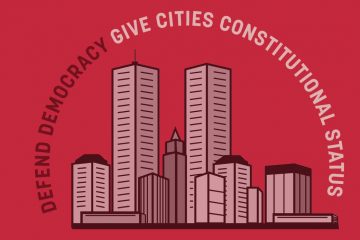Under the guise of “efficiency” and the need “to build homes faster”, Doug Ford has introduced a bill that would significantly transform the role of Toronto and Ottawa’s Mayors.
In reality, it is designed to strengthen a Mayor’s control over council, and at the same time to greatly weaken the Mayor and Council’s ability to pursue the city’s own interests and priorities. Mayors would have enhanced powers when they seek to implement the provincial government’s political priorities. But the city’s ability to independently determine and implement the priorities of its own diverse population would be drastically weakened. Ontario’s grip on municipal life would be tightened. Mayors would become enforcement agents for the province; councillors’ ability to represent the interests of their electors would be drastically weakened. Specifically, it would be much harder for council to resist privatization and outsourcing, the spread of casinos and gambling culture, paving over of greenbelt, protection of industrial lands, and countless other examples of private-profit-driven urban blight that the current Tory government at Queen’s Park is eager to ramp up. And far harder to implement humane, far-reaching policies to alleviate the appalling plight of the homeless poor.
It is hard to find any city-dwellers in favour of this increased power—except Doug Ford and his lobbyist friends in big business, notably developers. The proposal is so contrary to popular opinion that it was not included in the provincial Tories’ platform. They waited until the election was over to introduce it with their recent budget. Now they claim to have a “mandate” to implement this hitherto secret plan, cynically marketing it as a solution to the housing and rental affordability crisis that it will actually worsen.
Following on from the 2018 municipal election, in the midst of which Ford slashed the size of Toronto’s council from 47 to 25, this is yet another disruptive, ham-fisted, politically motivated and undemocratic intrusion into local governance. In a nutshell, the mayor would be given executive power to manage council affairs— from preparing and approving the budget, to appointing the chairs of committees, agencies, boards and commissions, the hiring and firing of city staff — and the power to direct them to do what he or she wants. It gives the mayor a veto over council decisions that conflict with “provincial priorities”, which could only be overruled by a two-thirds councillor vote. But this “all-powerful” mayor becomes accountable to the province, not to the electors in their city. The mayor actually becomes a puppet, and the councillors bit-players; the city is under the province’s control more than ever.
The goals of this restructuring are obvious: the further centralization of power in the mayor’s office, the sidelining of deliberation by councillors, and the general undercutting of basic democratic and participative principles in municipal governing institutions.
Toronto doesn’t need a “strong mayor”, which is the Tory plan. We need a “strong Council” with diverse voices and with resources to meet the needs of a vibrant city.
We need municipal powers entrenched in the Constitution of Canada, not changes at the whim of Queen’s Park. Currently, municipalities have no independent constitutional status. They are creatures of Queen’s Park.
Currently, thanks to Ford’s 2018 “coup”, many Toronto city councillors are forced to represent the needs of over 100,000 voters – more than the voter-age population of several provincial ridings. It’s unmanageable. We need an expanded council – with smaller wards and more councillors – along with other measures urgently needed to encourage and ensure more diversity, more candidates, more voter participation, more democratic public control.
Funding is absolutely key. Dependence on property taxes and user fees is extremely regressive, not to mention clumsy and cumbersome. Property tax should be limited to the costs of servicing property (fire, police, water, garbage, etc) and relieved of the costs of education, health, housing, transportation, etc. which would cut property taxes by 75%.
We shouldn’t have to approach the province cap-in-hand for ad hoc bailouts or assistance when there are financial difficulties. This unchanged situation suits the Tories just fine.
The provincial government must either provide municipalities with stable and adequate statutory funding, sufficient to meet the financial needs of modern cities, or provide cities with the wealth-taxing powers they need to directly generate the revenues needed to run modern cities. That would be socially progressive and not subject to the vagaries of changes in governing parties.
We must prevent and reverse the downloading of services from province to municipalities, which has taken place over recent decades without commensurate funding. Toronto and Ottawa both need strong entrenched powers over planning, housing, transit, public health, environment, etc, not subject to the OMB and other provincial agencies.
We must prevent and reverse the privatization of services, which the Tories favour, and which allow corporations to make profit on the backs of the working class, who depend on them.
This is a cynical power grab which must be resisted.
Statement on the Strong Mayor, Building Housing Act (Bill 3) by the Toronto Committee, Communist Party of Canada, Aug 18 2022.


